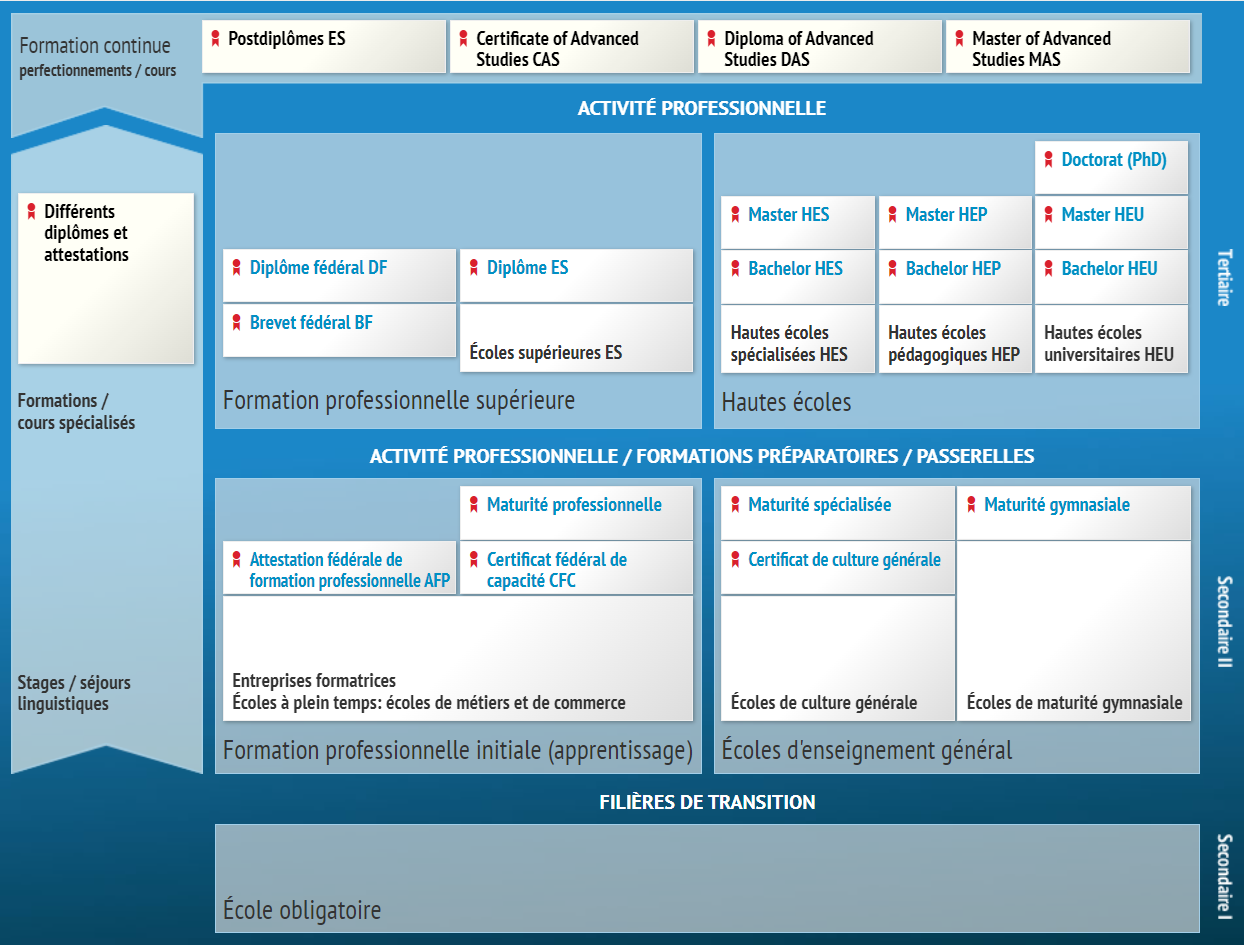Federal certificate or Certificate of Advanced Studies. Are you hesitating between the two? If you're looking for further industry experience, it can be difficult to choose between professional training and university continuing education. These two systems have a lot in common, but they don't cater for the same profiles (nor are they recognized in the same way). So which is the best training option? We explain it all in this guide!
Switzerland's professional training and continuing education system
Vocational training in Switzerland
In Switzerland, higher professional training refers to the non-university tertiary sector. It provides the qualifications you need to become a specialist or manager.
It is divided into:
- Colleges of higher education (ES): in Switzerland, there are some 400 ES courses covering eight main fields (economics, health, hospitality, technology, social work, visual arts, transport and agriculture). Combining theoretical and practical training, these courses provide specialized knowledge of the field in question.
- Federal patents and diplomas (BF or DF): under the responsibility of labor organizations, these exams are aimed at people wishing to specialize in a particular field. While a federal diploma entitles the holder to a managerial position, a federal diploma attests to expert skills in a particular field!
To qualify for higher education, a federal patent or a federal diploma, you'll need to hold a "Certificat fédéral de capacité (CFC)" and have several years' professional experience.
University continuing education in Switzerland
Also known as refresher courses, continuing education is designed to deepen technical knowledge in a particular field. The aim? Improve the participant's professional prospects and encourage personal development. A wide range of topics are covered, from management and marketing to data analysis and project management.
These courses, generally provided by universities or colleges, last from a few hours to several years, and award several types of diploma. These include CAS (Certificate Advanced Studies), MAS (Master Advanced Studies) and DAS (Diploma of Advanced Studies).
Would you like to find out more about these two training systems? Take a look at this interactive diagram of the Swiss education system.

Similarities between professional training and continuing education
Practical programs
Vocational training and continuing education provide practical knowledge that can be put to use in everyday life. Diplomas, be they Swiss Federal Diploma (BF), Swiss Federal Diploma (DF) or CAS/MAS/DAS, focus on imparting practical knowledge.
Although the subjects taught may be similar, professional training and continuing education are aimed at different professional profiles and projects.
Evolving courses
Here again, there are similarities between professional and continuing education in Switzerland. Both offer progressive programs. For example, you can obtain:
- For continuing education: a CAS can be supplemented by a DAS or MAS. Note that the MAS is not a "Master's" as it is called in other universities.
- For professional training: a federal certificate followed by a federal diploma. The latter is based on the skills acquired in the federal diploma, to which managerial skills will be added.
The aim is to enhance your skills and specialize in your field, so that you can progress within an organization.
The major differences between professional training and continuing education
Academic vs professional programs
Course content differs according to the type of program:
- Vocational training, through certificates and diplomas, is more operationally oriented. It has a strong practical orientation, since it involves specialization in a given profession. This enables you to deepen your knowledge of a specific trade.
- On the other hand, continuing education, via CAS/DAS/MAS programs, focuses on operations and strategy. In other words, these diplomas will enable you to perfect your skills in an existing position and gain additional competencies. In your day-to-day professional life, you'll be able to make better decisions.
As you can see, the prospects and opportunities are totally different! Nevertheless, the prerequisites for both types of training remain demanding. If you'd like to find out more about the criteria you need to consider to make the right choice, read our dedicated article.
Origin of participants
Here again, admission requirements differ according to the type of program.
Historically, participants who have completed an apprenticeship and obtained their CFC (Certificat Fédéral de Capacité) will move on to professional training: federal certificates and diplomas.
On the other hand, university graduates will tend to join the continuing education stream and take up a CAS. In all cases, continuing education courses are aimed at participants who already have several years' experience in the professional world.
The good news? In Switzerland, there are many possible bridges between programs. Before making your choice, and depending on your objectives, don't hesitate to get in touch with the establishments concerned.
Diploma recognition in Switzerland vs abroad
Finally, diplomas do not have the same recognition and value around the world.
- Federal diplomas are part of higher professional training: they are managed by the Swiss Confederation and are recognized only in Switzerland.
- CAS, MAS and DAS are continuing education qualifications: they are recognized by all universities operating under the Bologna system. This European standard assigns ECTS credits to each exams. For example, a CAS requires a minimum of 10 ECTS credits (1 ECTS credit = 30 hours of work). The advantage? These ECTS credits allow you to move from one school to another, and to accumulate education credits!
HEC Executive Education offers a wide range of continuing education courses, leading to a CAS, MAS and/or DAS. Our areas of training include leadership, management, data science, accounting and finance, and marketing.
As you can see, each format has its advantages and disadvantages! The choice between professional training or continuing education will depend on several criteria: your professional objectives, your background (studies, diplomas, professional experience) and, if applicable, the discussion with your employer. So make the difference!
Découvrez nos formations continues



